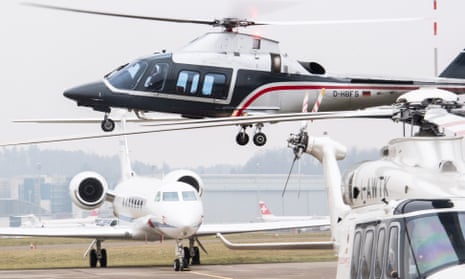Davos is no place for fighting. It is where chief executives fly to in private jets to discuss the dire consequences of climate change, where hot-money speculators deliver homilies on responsible investing, and the world’s media receive every falling cliche with unctuous warmth. Yet last month it was here in Switzerland, amid the sharp shooters and roadblocks, that a very revealing skirmish broke out.
At a panel devoted to “making digital globalization inclusive” (for Davos is mainly a hollow-eyed human re-enactment of the drabbest Economist editorials), computer tycoon Michael Dell was asked what he thought about a 70% tax on earnings of more than $10m a year. The very idea provoked speakers and audience to peals of laughter. What a joke, to take money away from these deserving multimillionaires! Dell, the 39th richest person in the world, replied that he and his wife already give to charity: “I feel much more comfortable with our ability … to allocate those funds than I do giving them to the government.” Who needs the imprecise squall of democracy when a man worth $33bn can decide what the masses need? He went on: “I don’t think it will help the growth of the US economy. Name a country where that’s worked – ever.” Fervent agreement followed until economist Erik Brynjolfsson butted in, citing one country that had had such high tax rates: “The United States … from about the 1930s to the 1960s … and those were pretty good years for growth.” Brynjolfsson is not known for his socialism and his intervention was far milder than that made two days later by historian Rutger Bregman (“Taxes, taxes, taxes … all the rest is bullshit”), but still, the aromatic consensus had been broken.
Were I Anand Giridharadas’s publisher, I would broadcast that exchange as an advertisement for his latest book, in which he takes aim at his favourite targets. The elevation of business people to “leaders”, whose views somehow soar above self-interest; the nose-wrinkling dismissal of messy politics; the blimpish disregard for even recent history – all are present and shown as incorrect in Winners Take All.
The big questions animating this book are the ones central to western politics today: why is the state of affairs made nonsense by the economic crisis still in place? What explains both the governing class’s lack of serious response to 2008’s banking crash, and the vast inequality that continues in its wake? Rather than economic or political analysis, Winners Take All is a study of the alibis and strategies used by Dell and his kind to justify inertia. Giridharadas takes us inside charitable foundations and back-slapping summits to meet management consultants, greying politicians and a few of the most important names in philanthropy. His is the view from the panel discussion, the venture capitalist’s boardroom and the fundraiser with its bespoke canapes.
As reporting assignments go, this calls not so much for a flak jacket as a sick bag. In a Manhattan crammed with visiting dignitaries for UN week, Bill Clinton convenes a conference at which the audience is told: “Empowering girls and women is the hot new branding thing!” David Miliband gazes on as the boss of Western Union chides the prime minister of Sweden: “One of the issues in the politicians, with all due respect, Mr Prime Minister, is that you guys are voted by local people, but you’re responsible for global issues.” Never mind that Mr Western Union is beholden to his shareholders, it’s the nation state that’s parochial.
Giridharadas boards a cruise ship bound for the Bahamas, doubling as a floating conference for entrepreneurs apparently hungry for social justice. Into this arena is beamed Edward Snowden, whose exposing of the US’s surveillance regime led to his exile in Moscow. He talks to the assembled cruisers about the necessity of heretical thinking, before the Silicon Valley moneyman interviewing him breaks in: “So I invest in founders for a living. And I gotta tell you … I smell a founder here … there’s probably investors waiting for you here.”

Witnessing such hubris and hypocrisy must have been hard on the stomach; it does, however, make superb hate-reading. Through these vignettes, Giridharadas depicts an elite he dubs MarketWorld, an international nexus of consultants and business people and centrist politicians who want “to change the world while also profiting from the status quo”. Its hubs include Silicon Valley and Wall Street, its feeding stations Davos and all the other expensive talking shops. Its denizens have access to political power and millions to buy wider influence, through donating to universities and museums. In his bemused defensiveness over higher taxes, Dell was the embodiment of MarketWorld. The billionaires in this book prefer markets to governments, policies to politics, and love solutions that are win-win – which is another way of saying that they should never lose. Theirs is conservatism camouflaged in radical adjectives; change you can’t believe in.
In this exotic land, Giridharadas is an insider-outsider. Having spent half a chapter beating up McKinsey management consultants, he later reveals that he worked there. Pages are spent laying into TED talks, even though the author has delivered two. His wife is Priya Parker, who describes her business as helping “activists, elected officials, corporate executives, educators, and philanthropists create transformative gatherings” of precisely the kind her husband skewers in this book. As for networking, Giridharadas admits to mingling with “the ultra-rich in antler-decorated mansions overlooking the Roaring Fork Valley”. Fair enough: a man’s got to eat – and he might as well eat devilled eggs.
That background allows him precious access and imbues the text with a catty intimacy that is hugely enjoyable. His one-liners and storytelling zest make Giridharadas the guy who you want to hang out with on the sidelines of that earnest cocktail party. But his analysis could do with some deepening. The ugly vanity of MarketWorld may be eye-catching, but what makes it unfair is that it is bankrolled by the rest of us, through lower wages and low taxes on wealth. Simply put, we pay the billionaires to tell us what to do. What gives their demands such amplification isn’t just their money, vital though that is, it is that they and their friends in government have razed many of the countervailing institutions, whether organised labour or local government. Winners Take All doesn’t name it, but what it’s really describing is an institutional crisis in which the political landscape has been cleared of its forces for representation and reformation. Instead, power has been put in the hands of a group that believes trade unions are merely cartels, thinkers are far inferior to “thought leaders” and hell is other people voting.
Giridharadas’s answer to all this is simple: a bigger and more powerful state. “The government is us,” he quotes Italian philosopher Chiara Cordelli approvingly. And he is right that it is high time politics took back the ground it has lost to policy. But barely more than a line is spent acknowledging that there are plenty of times the government is not us – when it is taking away our benefits, when it is displacing us from our homes, or when it is cutting taxes for corporations while closing children’s centres.
Arguments aside, this is a good book whose most subtle and powerful moments come when Giridharadas finds other insiders with a hankering to be on the outside, agents of change who know that the system they work within only shortchanges us. People such as Darren Walker, the sharp-minded African American head of the Ford Foundation charity, who knows the root problem goes deeper than poverty and bad luck; it is inequality. Riding his black limousine into “the belly of the beast”, a private equity firm, Walker plans how he will broach that argument, but finds himself in front of an impassive audience and resorts to a familiar vaudeville act of telling his harsh life story: born in a hospital run by a charity, raised single-handedly by his mum, working as a busboy aged 12 … The executives respond by asking how he motivates staff.
In this way, banal humiliation is heaped on a good and relatively powerful man trying to reform a system that, on all the available evidence, may not be reformable.

Comments (…)
Sign in or create your Guardian account to join the discussion